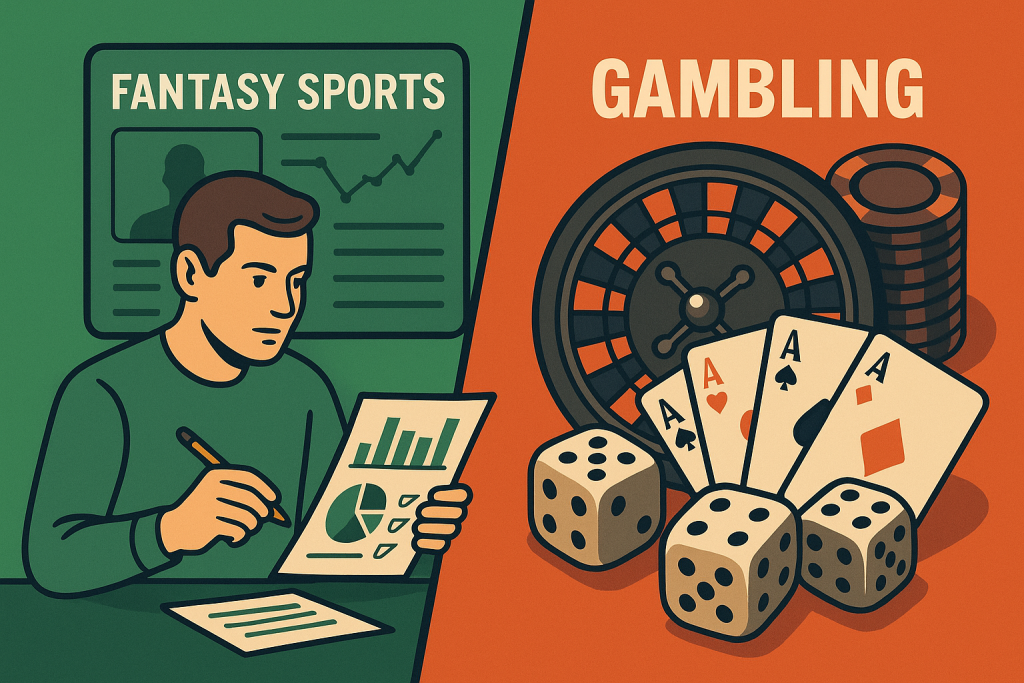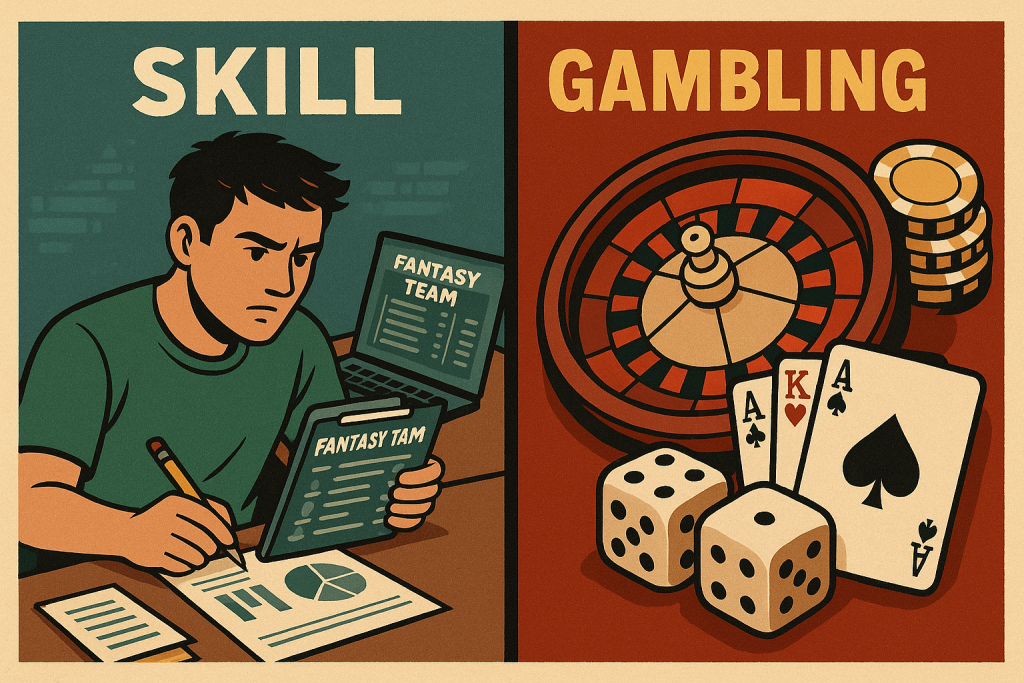Gaming is typically divided into two main categories: skill-based and chance-based gaming.
Skill-based gaming is entirely dependent on the participant’s mental and physical abilities. Success in these games comes from the player’s knowledge, strategy, and execution. Examples include sports, puzzles, and competitive video games, where improvement over time is possible through practice and experience.

On the other hand, chance-based gaming involves an element of luck, which plays a significant role in the outcome. This category includes activities like roulette, slot machines, and lotteries, where the result is largely determined by random factors. Chance-based gaming is often associated with gambling, as it typically involves staking money or valuable assets based on the hope of a favourable random outcome.
In essence, while skill-based games rely on a player’s abilities, chance-based games are driven by luck, making them a form of gambling.

Over the past decade, fantasy sports have transformed from a niche hobby into a billion-dollar industry, captivating millions worldwide. With platforms like Dream11, My 11 Circle and others offering competitive leagues across various sports, fantasy gaming has become more than just entertainment—it’s a serious business. But amidst the excitement and financial stakes, a debate persists: is it a game of skill, or just another form of gambling?
The Mechanics of Fantasy Sports
Before getting on with this debate, let us understand how it all works–Fantasy sports involve selecting a virtual team of real-life players whose performances in actual games determine the participant’s score. Users draft teams based on player statistics, analyze past performances, and strategize for optimal results. Winners often earn cash rewards, making the game financially appealing.
The industry thrives on user engagement, data analytics, and a deep understanding of sports. This combination has fueled its growth, attracting investment from major corporations and sports leagues. However, this rise has also invited scrutiny from regulators and policymakers, raising questions about the legality and ethics of fantasy sports.

Skill vs. Gambling: The Legal Conundrum
The central debate around fantasy sports is whether they rely on skill or luck. Advocates argue that fantasy sports require significant knowledge, strategy, and research—similar to stock market trading. Users must analyze player statistics, injury reports, weather conditions, and game strategies, making informed decisions to maximize success.
On the other hand, critics claim that, despite skill elements, the unpredictable nature of sports introduces a level of luck similar to gambling. Factors like injuries, unexpected performances, or referee decisions can drastically alter outcomes, making it difficult to dismiss the role of chance entirely.

Different jurisdictions have addressed this debate in varied ways. In India, the Supreme Court has ruled fantasy sports as a game of skill, exempting them from gambling laws. Meanwhile, in the U.S., regulations vary by state, with some classifying fantasy sports under gaming laws.
The Fantasy Sports Boom and Its Impact on the Sports Industry
Fantasy sports have revolutionized how fans engage with traditional sports. The industry’s impact is evident in several ways:
1. Increased Viewership and Fan Engagement
Fans who play fantasy sports are more likely to watch live games, track player performances, and engage with sports-related content. Leagues like the IPL, NFL, and NBA have benefited from increased TV ratings, sponsorship deals, and merchandise sales.
2. Commercial Expansion and Sponsorships
Fantasy sports platforms have created new revenue streams through sponsorships, advertisements, and partnerships with major leagues and franchises. Brands see fantasy sports as a lucrative market, investing heavily in promotions targeting fantasy users.
3. Sports Analytics and Data-Driven Decision-Making
The rise of fantasy sports has also driven the evolution of sports analytics. Teams and analysts now use advanced statistics to evaluate player performance, enhancing recruitment strategies, coaching decisions, and fan engagement.
4. Ethical and Regulatory Concerns
Despite its positive impact, fantasy sports face criticism for promoting addictive behavior, especially among younger audiences. Concerns about financial losses, fair play, and misleading advertisements have led to calls for stricter regulations to ensure responsible gaming.
The Future of Fantasy Sports: Where Do We Draw the Line?
As the fantasy sports industry continues to grow, the skill-versus-gambling debate will persist. Striking a balance between innovation, responsible gaming, and regulatory oversight will be crucial in determining the industry’s future.

For sports fans, fantasy sports offer an immersive way to engage with their favorite games, but the risks associated with financial stakes cannot be ignored. Whether it’s skill or gambling may ultimately depend on how the industry evolves and how governments regulate it. One thing, however, is certain—fantasy sports are here to stay, shaping the future of the sports entertainment landscape.
By: Dr. Vipul Lunawat, Director, Institute of Sports Science & Technology

0 Comments